April 28, 2024 | 11:04 GMT +7
April 28, 2024 | 11:04 GMT +7
Hotline: 0913.378.918
April 28, 2024 | 11:04 GMT +7
Hotline: 0913.378.918
This opinion was given by Minister of Agriculture and Rural Development Le Minh Hoan at the Conference on implementing a number of key tasks and autonomy for training establishments under the Ministry in 2024, organized by the Ministry of Agriculture and Rural Development in Dong Nai province.
According to the Department of Personnel Organization (Ministry of Agriculture and Rural Development), there are currently a total of 36 public service units in the field of education and training under the Ministry of Agriculture and Rural Development, including 1 Academy; 3 Universities; 30 Colleges; 1 School of Management Officers; 1 School of Public Policy.
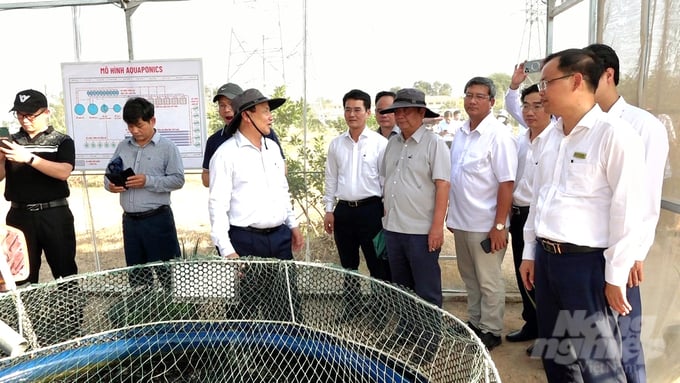
The goal of innovation is to improve the effectiveness of training high-quality human resources to meet the needs of sustainable development of the agriculture and rural development sector. It is also necessary to innovate cognitive thinking, adapt to change, and carefully prepare for conditions, requirements for autonomy in quick creativity and finding the best solutions. Photo: Minh Sang.
In 2023, the Ministry of Home Affairs and the Ministry of Finance have also issued documents clearly stating and setting a deadline for implementing autonomy in public service units and state management of the Ministry in general, including staff work and recruitment.
Therefore, with the goal of innovating and improving the effectiveness of training high-quality human resources to meet the needs of sustainable development of the Agriculture and Rural Development sector, it is necessary to innovate cognitive thinking, adapt to change, and prepare carefully the conditions and requirements for autonomy, agility and creativity and therefore find out the best solutions. However, after 2025, if universities and vocational education institutions do not ensure a level of recurrent expenditure autonomy or higher, they will be reorganized accordingly.
Director of the Department of Personnel Organization (Ministry of Agriculture and Rural Development) Ngo Hong Giang said: The training and development of human resources to serve agricultural and rural development will always receive the attention of the Party and State, with the goal that by 2025, the rate of trained workers is 70% and 28-30% must have degrees and certificates. To date, there is 1 public service unit that self-funds regular expenses (belongs to group 2), and 35 public service units that partially self-fund regular expenses (belongs to group 3).
According to Mr. Giang, regarding the autonomy of public service units, up to now the legal framework established by the State is quite complete and clear. However, limitations exist in raising the self-sufficient level of regular expenditure for educational, training and vocational units under the Ministry due to fluctuating market prices and reduced revenue sources of the units, so that regular expenses at some schools still faces many difficulties.
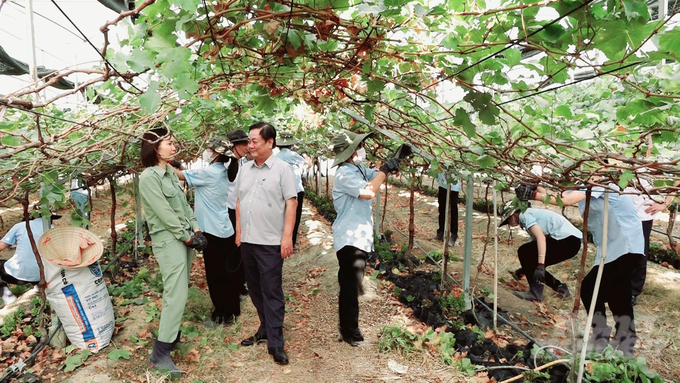
Promoting autonomy, including financial autonomy, for educational and training institutions is an inevitable trend in the face of the need to improve training quality. Photo: Minh Sang.
In fact, there has been an imbalance between training sectors and occupations. There are professions with little or no enrollment; The proportion of pupils and students studying at the school is small, mainly trained at affiliated centers and intermediate schools. University enrollment in traditional fields such as: Soil science, crop science, rural development, aquaculture, silviculture, forest resource management, food technology, post-harvest technology, hydrology, water engineering construction techniques... have also declined.
The reason is that people studying agricultural majors are mainly children of farmers in difficult rural and mountainous areas, and the income in the industry is very low, only 39% of the national average, so the mentality is to promote non-agricultural industries to have conditions to start a business in urban areas and in industrial parks. Therefore, it has had a major impact on the shortage of agricultural human resources with university and postgraduate degrees.
Currently, promoting autonomy, including financial autonomy, for educational and training institutions is an inevitable trend in response to the need to improve training quality. Autonomy allows schools to make decisions faster and more dynamically, thereby promoting innovation and creativity, which is a decisive factor in improving the quality and competitive advantage of schools. Delegating autonomy is one of the breakthrough solutions to improve the quality of human resource training.
Being the only unit of the Ministry and implementing autonomy in group two and partial autonomy in recurrent expenditure reaching 100%. At the same time, it is also the first in the agriculture, forestry and fishery sector to pilot university autonomy, according to Decision 873/QD-TTg and Resolution No. 77/NQ-CP, Vietnam Academy of Agriculture has a lot of experience in autonomy and has been included in the Higher Education Law for replication.
Prof. Dr. Nguyen Thi Lan, the Director of the Vietnam Academy of Agriculture shared: "After piloting autonomy, we found that the staff has become more mature, more dynamic, more creative and has more thinking about better agricultural economy. Each individual is aware that autonomy is very important, we are aiming at how to integrate the spirit of autonomy into research, teaching, and training to achieve the highest efficiency."
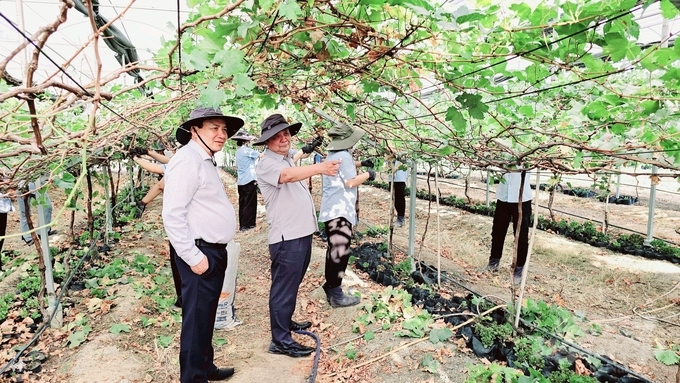
Autonomy in vocational education is an inevitable trend, including in education and training. Photo: Minh Sang.
According to Prof. Dr. Nguyen Thi Lan, in the initial period of piloting unit autonomy, the unit also encountered many difficulties in terms of inconsistency and overlapping legal regulations. However, with the determined efforts of the leadership and staff as well as the support of the Ministry of Agriculture and Rural Development, the Academy has achieved important results in autonomy in university. Thereby, domestic and international organizations recognized and highly appreciated the quality of training and activities of the Vietnam Academy of Agriculture. “The Academy determines that training quality is survival and scientific research is the vitality of the university. Therefore, training and scientific research are always linked to the needs of the market, domestic and international businesses," Prof. Dr. Nguyen Thi Lan affirmed.
Principal of Vocational College of Machinery and Irrigation, Mr. Nguyen Van Chuong also said that autonomy in vocational education is an inevitable trend, including in education and training. However, it is necessary to reorganize all training tasks to be reasonable and harmonious. At the same time, we call on all officials, teachers and students to accompany school leaders to well implement the autonomy mechanism.
“Currently, we have achieved good autonomy, with recurrent expenditure reaching 67%, which is the highest level of autonomy for educational and vocational training establishments under the Ministry. The school is currently rearranging its organizational structure to be flexible and operate effectively, with the goal of improving the quality of input enrollment and ensuring harmonious and consistent output quality with the development needs as well as the actual needs of recruiting businesses", said Dr. Nguyen Van Chuong.
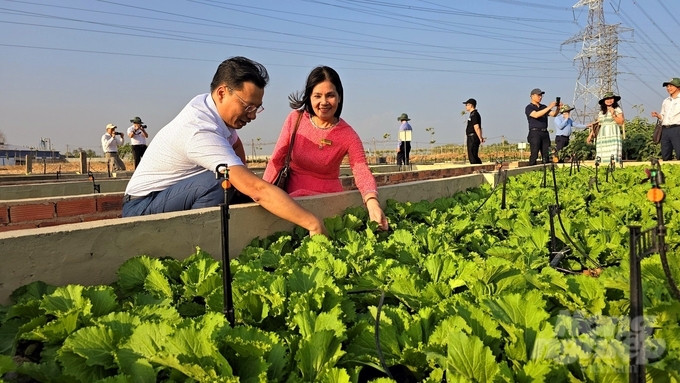
Schools focus on strongly developing science, technology and knowledge activities based on the school's strong staff, service activities based on knowledge space and services based on high technology. Photo: Minh Sang.
To effectively implement the issue of autonomy, the Vietnam National University of Forestry also focuses on mobilizing resources from outside the school, including internationally, to create better innovation in the field of training and attracting students' enrollment and investment sources for the school.
“Our school is always ready to implement autonomy and will deploy solutions to achieve full autonomy by 2026. Therefore, we will focus on strongly developing science, technology, and intellectual activities based on the school's strong staff, service activities based on knowledge space and services based on high technology".
Minister Le Minh Hoan emphasized: To effectively implement autonomy, including financial autonomy, training institutions need to focus on innovating training thinking in an open direction, proactively promoting cooperation training, consulting, technology transfer, product commercialization, revenue sources, and good exploitation of existing facilities. Furthermore, implementing autonomy will contribute to improving training quality and competitiveness for sustainable development. Actively connect with localities, businesses and research institutes in fields related to training occupations.
“Schools need to strengthen the connection between vocational education institutions and businesses in the direction of encouraging businesses to develop vocational education institutions to provide training to meet the needs of the labor market. Focus on building policies so that businesses can participate in vocational education in the form of orders from the State and other businesses...", said Minister Le Minh Hoan.
Translated by Bao Ngoc
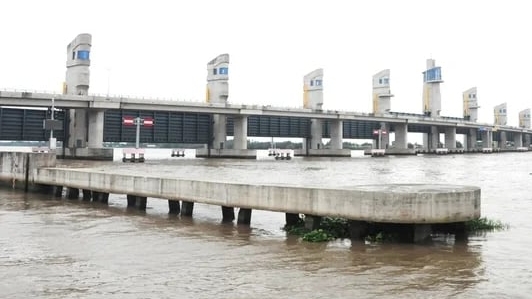
(VAN) Large-scale irrigation projects in the Mekong Delta have safeguarded a beneficiary area spanning more than 1 million hectares, significantly mitigating damage caused by drought and saltwater intrusion.
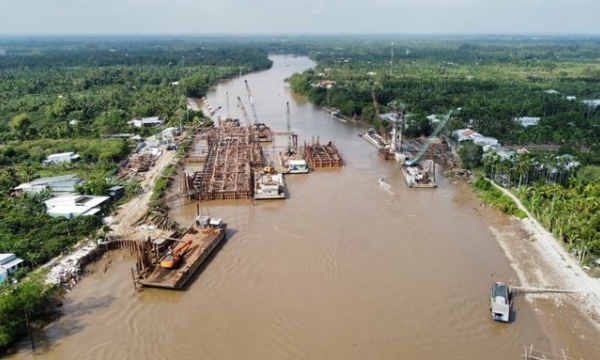
(VAN) Residents along the south bank of the Hau River are anticipating the Rach Mop lock by the end of 2024, along with projects to fortify the irrigation system to prevent saltwater intrusion.
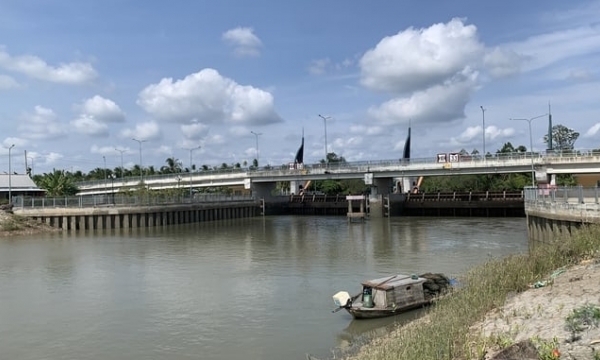
(VAN) The Bong Bot - Tan Dinh sluice delivers fresh water to meet the production demands of thousands residing in Tra Vinh province's coastal areas.
/2024/04/26/0500-3-135847_403.jpg)
(VAN) According to Dr. Dao The Anh, if indigenous varieties that are highly nutritious and adapt to climate change can be developed, the community will greatly benefit.
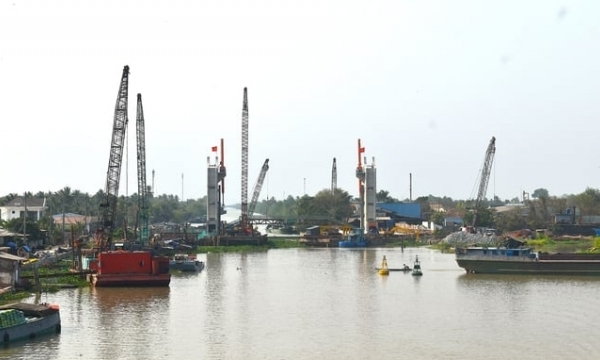
(VAN) The Nguyen Tan Thanh sluice is crucial in preventing salinity and storing freshwater to meet the daily needs of over 1.1 million residents in Tien Giang and Long An provinces.
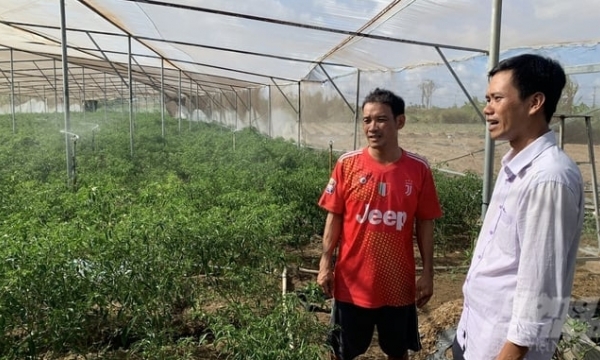
(VAN) The project, sponsored by the European Union, is implemented in Dong Thap, Kien Giang, and Tra Vinh provinces, with a total funding of 4.2 million Euros.
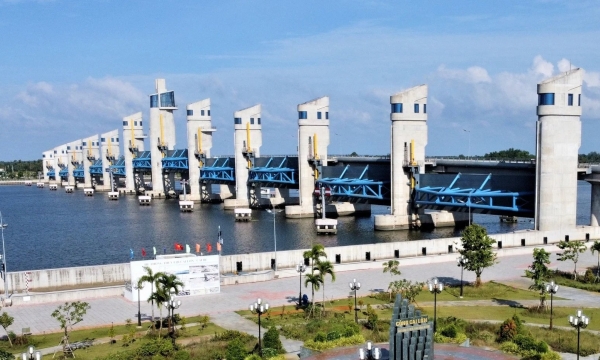
(VAN) In the heart of the Mekong Delta, the Cai Lon and Cai Be sluice gates act as guardians, halting the incursion of salty tides deep into the inland fields and managing freshwater resource distribution.